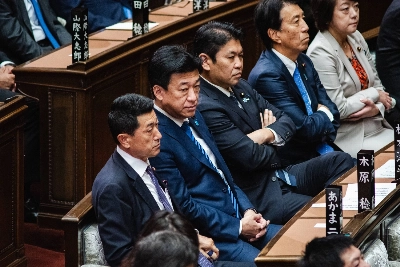When she was a child, environmental activist Vandana Shiva spent her free time walking in the Himalayan forests of northern India. Much later, before going to do her doctorate at the University of Western Ontario in London, Canada, she returned there to one of her favorite places. "There was a beautiful oak forest and a lovely stream," she recalls. "And when I went, there was no forest and no stream, because the World Bank had started a project to plant apples and they cut the native forests. But these were the source of the rivers, so once they were gone, the streams were gone."
The year was 1974. Two years earlier, logging had caused disastrous floods in the region that had washed away an entire valley. Shiva joined a peaceful anti-logging movement there called Chipko, which means "to embrace," and that was what the villagers did. "Hugging the trees was an expression that 'these trees are us,' and we will hug them before loggers can cut them," she explains.
"The experience was about a different kind of economy. Good natural forests are the basis of sustenance. The most prosperous villages can be found up there, and there isn't even half a dollar a day." Chipko was formative for Shiva personally, as well as for India's fledgling environmental movement. Until then, sustainability was seen as a luxury imported from rich Western countries. "Because of Chipko," she says. "It became clear that conservation is a bigger imperative for the poor."
Articulate and upbeat, Shiva is active in the grass roots of India and abroad, campaigning on issues such as biodiversity, farmer's rights and the spread of genetic engineering in agriculture. She promotes organic farming and preservation of local crops through "seed banks" that have sprung up all over the country. A fierce critic of trade liberalization, she blames multinational corporations, the World Bank and G-7 nations for undermining democracy, creating economic and social instability, and destroying ecosystems and local cultures.
"What is called 'free trade' is not a free economy," she insists. "It's freedom for [agribusinesses like] Monsanto or Kargil, but not for the farmers . . . or consumers who want safe and healthy food."
Debt and suicide
In post-"green evolution" India, subsistence farming has been replaced by thirsty cash crops that deplete soil and water tables, keeping farmers dependent on chemicals and genetically altered seeds, driving them deeper into debt and, more recently, suicide.
In "Seeds of Suicide," Shiva writes of the dramatic rise in suicide rates among debt-ridden farmers in the last five years. In 1998, her research organization Navdanya prevented the U.S. firm RiceTec from patenting basmati rice, which would have forced farmers to pay royalties on a native crop grown in their region for generations.
"The big debate in India on biodiversity, genetic resources, and water is that [they] don't belong to the state to be sold off to corporations," she says. "They belong to the communities to look after them on the basis of democracy."
In her latest book, "Water Wars: Privatization, Pollution and Profit" (South End Press; 2002), Shiva focuses on the water sector, where privatization by a handful of corporate giants such as Suez Lyonnaise des Eaux, Vivendi Environment and Bechtel is happening "virtually overnight."
She tells how, in her lifetime, she has seen India and other water-rich regions dry up as human activity and population growth have led to climate change. Dams redirect water away from communities and steer small-scale farmers into commercial agriculture and industry, which can more easily buy -- and pollute -- vast quantities of water. The resulting scarcity is creating tension between India and its neighbors, as along other major rivers elsewhere, including the Nile, the Rio Grande and the Colorado.
Calling the parched Middle East a region where water's role in the violence is overlooked, she writes: "Such misrepresentation diverts much-needed political energy from sustainable solutions to water-sharing."
Her book describes villages in India that set up "water temples" offering free public water in earthen pots. But the water market is spreading through the country just as quickly as these sacred traditions are disappearing -- clay pots being replaced by plastic bottles.
"If I'm in a village," Shiva says, "and the government allows [our reservoir] to be owned by Coca-Cola . . . [its water] must then be bought back from the company, just like with seeds."
Like many Indian activists, Shiva was strongly influenced by Mahatma Gandhi, whose concept of swadeshi emphasizes local economies and community control of resources. For her, this is a feasible and necessary alternative to the single model of development now being foisted on the developing world, which favors industrial urbanization and cash economies. Chipko taught her the importance of what she calls "living democracy," she says. "Because life is not in stocks or shares," she says, "life is in our homes, rivers, streams and forests."



















With your current subscription plan you can comment on stories. However, before writing your first comment, please create a display name in the Profile section of your subscriber account page.